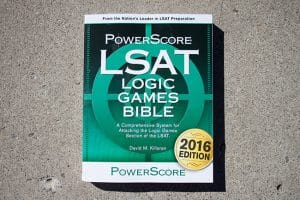Understanding Global and Local question strategies in Logic Games is difficult. Dave's blog post on the subject got me thinking about recent conversations I've had with students on similar topics, primarily with respect to efficient inference making and question attack. So I'm going to supplement his insights with a few of my own. Positive and Negative Certainty We focus a tremendous amount of time and attention in our courses and books … [Read more...]
Global/Local Question Answering Strategies
A while back, I received an interesting question from a student: “Hi, I have your Logic Games Bible and have a question. Another book recommends answering local “if” questions first then doing what you call global questions. I don't believe the Bible makes any recommendations about which questions to answer first. Do you have a question ordering strategy or you simply recommend answering them in the order they appear on the test?” Strategies … [Read more...]
How to Guess Like a Pro on the LSAT Part I: Logic Games
There is no penalty for guessing on the LSAT. So, it should go without saying that you shouldn't leave any questions blank. Precisely how you guess, however, depends on a number of factors.Are you a strong test-taker? Can you at least narrow down your possible choices? Which questions do you need to guess on?Let's break it down. Blind Guessing According to our Guessing Strategy and Probability Tables, you would be best served by … [Read more...]
Tiered Circular Games: AKA the 10th Circle of LSAT Hell
The last time a Circular Linear game made an appearance on an LSAT was the February 2014 exam. Unfortunately, this test is undisclosed, so we will never actually see the game. This very game is also rumored to be a "tiered circular linear" game. It involves two variable sets to be distributed around a circle. We'll never know for sure, but such a game is not outside the realm of possibility. The following list shows every single appearance of a … [Read more...]
Diagramming on the LSAT Part II – Notation Suggestions
In the first part of this series, I address LSAT diagramming and how to better determine its usefulness for you. Essentially, I suggest that diagramming is an investment of your time and rhythm. In order for that investment to be worthwhile, it needs to pay dividends in terms of two things:Gaining you more time than it took as you continue on. Like a prephrase, where you can more aggressively/efficiently sort through the answers. Leading … [Read more...]
The Importance of Cutting Through the Bullsh*t on the LSAT
With the notable exception of Logic Games, the LSAT is full of confusing, redundant information. Unfortunately, every single Reading Comprehension passage will contain needlessly complex details. These details often combine with unfamiliar jargon and forays into minutiae that detract from the main point of the passage and obscure the purpose. Reading Comprehension boils down to two primary objectives: read and comprehend (duh!). The thing is, … [Read more...]
Curveballs in LSAT Logic Games
. With the release of the June 2014 LSAT, we can take solace in the notion that, although 99.9% of test-takers bombed the last game completely, better days lie ahead. For one thing, missing every single question on that game only brings your score down to 177. This is thanks to the exceptionally generous curve on that test. Why was the curve so generous? See the first sentence above. Here's the funny thing about exceptionally brutal games: they … [Read more...]
Should I Answer Questions on the LSAT In Order?
Many students don't take much time to consider the order in which they attack the questions on the LSAT, but the right strategic approach can be extremely valuable. For most test-takers, the natural inclination is to do all or most of the questions in order. However, there are quite a few benefits from a slightly more flexible approach to every section of the test.Logic Games Most students start the Logic Games section by diving right into … [Read more...]
Logic Games Practice Tips
When preparing for the LSAT, it's not uncommon to study long and hard. There are only so many official LSAT practice tests and there's a chance you will eventually run out. So, what do you do if you run out of Logic Games questions and still want to raise your score? With no new questions, you may worry about getting rusty and your score deteriorating. This situation comes up more frequently than you may think! Let's get into some tips on what to … [Read more...]
Unusual Rules in LSAT Logic Games: Part II
This is Part II of our blog series covering the emerging trend of making you labor over strangely-worded or confusing rules in LSAT Logic Games. You can read the first part of the blog here. It’s worth repeating that none these rules can be described as ambiguous, i.e. none of them are open to multiple interpretations. Indeed, each rule entails a concrete and definitive outcome.In the second part of this blog series, we will analyze a … [Read more...]
When to Move to the Questions in LSAT Logic Games
I've written two posts on Logic Games recently, both in response to student questions, and this week I'd like to address a third question about games I was asked recently: How do you know when to move from your setup to the questions? I should start by saying that it's a very contextual decision. Some games (especially in recent years) have few inferences that can be made and you'll often feel as though you've discovered little in your initial … [Read more...]
Conditional Sequencing Rules in Logic Games
We're now ten weeks away from the LSAT, which still gives you plenty of time to prepare and reach your goals, but the clock is certainly ticking--if you're waiting for your course to begin that's fine!; if you haven't thought about how you intend to prep, however, it's time to get going.And even though it's still fairly early I regularly hear from anxious test takers, and unsurprisingly Logic Games often weigh most heavily on their minds. I … [Read more...]
The 2015 vs. 2016 PowerScore LSAT Logic Games Bibles
Every year, we release an updated version of the LSAT Logic Games Bible, including the 2016 version. We do this to account for changes in the test, to expand and clarify certain explanations, and to add new and refreshed content in order to keep the books as useful as possible. Because of the extent of these yearly changes, one of the most common questions we get each year is: can I use an LGB from a prior year to study for this year's LSAT? … [Read more...]
Unusual Rules in LSAT Logic Games: It’s the New Norm
Confusing Rules If you’ve taken any test from the last couple of years, you may have stumbled upon strangely-worded or confusing rules. For example: Train A can arrive earlier than train B if and only if train B arrives earlier than train C. Either car A arrives immediately before car B, or it arrives immediately after car C, but not both. The Q meal is served at some time after either the M meal or the N meal, but not after both. It’s worth … [Read more...]














